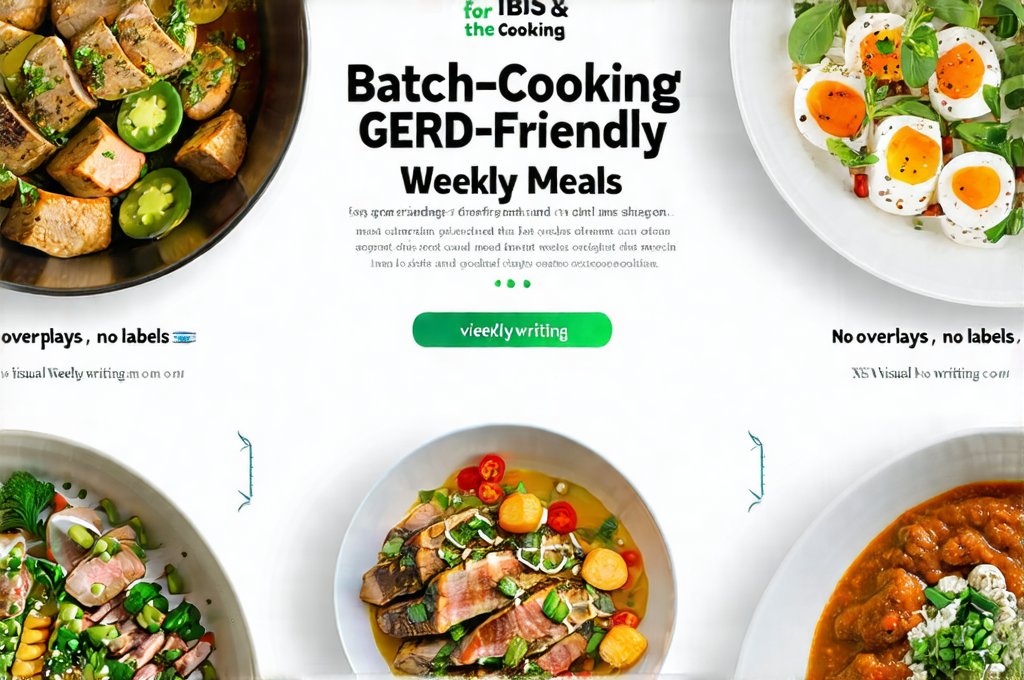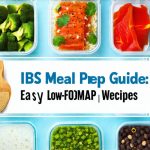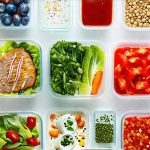Navigating dietary restrictions can often feel like an overwhelming task, especially when dealing with conditions like Irritable Bowel Syndrome (IBS) and Gastroesophageal Reflux Disease (GERD). Both require careful consideration of food choices to minimize discomfort and flare-ups. Many individuals find themselves constantly scrutinizing ingredient lists or avoiding entire food groups, leading to frustration and a sense of limitation in the kitchen. However, with thoughtful planning and preparation, it’s entirely possible to enjoy delicious, satisfying meals without compromising your digestive health. This is where batch cooking comes into play – a strategy that allows you to proactively manage your diet, save time during busy weeks, and maintain control over what you’re consuming.
Batch cooking isn’t simply about making large quantities of food; it’s about strategically preparing components or complete meals in advance, tailored specifically to address the sensitivities associated with IBS and GERD. This proactive approach can dramatically reduce stress around mealtimes and empower you to make healthier choices even when life gets hectic. By focusing on easily digestible foods, minimizing trigger ingredients, and utilizing gentle cooking methods, batch cooking becomes a powerful tool for managing these conditions and improving overall wellbeing. It allows for a more sustainable, less restrictive dietary pattern, moving away from constant reactivity and towards proactive nourishment. Understanding the importance of daily probiotic practices can also be incredibly beneficial for gut health.
Understanding the Dietary Landscape of IBS & GERD
Both IBS and GERD have distinct but sometimes overlapping dietary triggers. For IBS, low-FODMAP diets are often recommended, focusing on reducing fermentable carbohydrates that can cause bloating, gas, and abdominal pain. This includes limiting foods like onions, garlic, apples, pears, wheat, and certain dairy products. However, individual tolerance varies considerably, so identifying your specific triggers through an elimination diet is crucial. GERD, on the other hand, centers around minimizing acid reflux. Common culprits include fatty foods, spicy foods, caffeine, alcohol, chocolate, citrus fruits, tomatoes, and mint. Again, personalization is key – what bothers one person may not affect another.
The challenge lies in creating meals that address both sets of sensitivities. This often means prioritizing simple, whole foods prepared with minimal ingredients. Lean proteins, easily digestible carbohydrates like rice or potatoes (in moderation), and non-cruciferous vegetables are excellent starting points. It’s also important to consider cooking methods; steaming, baking, grilling, or poaching are generally better tolerated than frying. Focusing on portion control can also alleviate symptoms for both conditions – smaller, more frequent meals often put less stress on the digestive system. Thinking about dinner meals specifically designed for these conditions can be a great starting point.
It’s worth noting that dietary needs aren’t static. Flare-ups may require stricter adherence to these guidelines, while periods of remission might allow for greater flexibility. Listening to your body and adjusting your diet accordingly is paramount. Keeping a food diary can be incredibly helpful in identifying patterns and understanding how different foods impact your symptoms.
Building Your IBS & GERD-Friendly Pantry & Meal Plan
A well-stocked pantry is the foundation of successful batch cooking. Focus on staples that are generally tolerated by individuals with both conditions: – Gluten-free grains like rice, quinoa, or oats (ensure they’re certified gluten-free if you have a sensitivity) – Lean protein sources such as chicken breast, turkey, fish (salmon, cod), and tofu – Non-cruciferous vegetables including carrots, spinach, zucchini, potatoes, and bell peppers. – Healthy fats like olive oil, avocado, or nut butter (in moderation). – Herbs and spices that are gentle on the stomach, avoiding strong flavors and chili powder.
When creating your meal plan, think about versatile ingredients that can be used in multiple ways. For example, cooked chicken breast can become part of a salad, stir-fry, or soup. Rice can accompany fish, vegetables, or even be incorporated into a pudding. Planning several meals around the same core components simplifies preparation and reduces food waste. Consider dedicating one day a week to batch cooking – perhaps Sunday afternoon – when you have more time and energy. During this session, prepare ingredients like chopping vegetables, marinating protein, and cooking grains. This will significantly streamline your weekday meal prep. Using soup and stew-based meals can also be a convenient option.
A sample weekly plan might include: – Monday: Baked salmon with roasted potatoes and steamed spinach. – Tuesday: Chicken and rice soup using pre-cooked chicken and rice. – Wednesday: Turkey meatballs with zucchini noodles and a tomato-free pasta sauce. – Thursday: Tofu stir-fry with rice and carrots. – Friday: Leftovers or a simple meal like poached fish with steamed vegetables. – Saturday & Sunday: Flexibility for dining out, trying new recipes (carefully!), or enjoying simpler meals.
Gentle Cooking Methods & Ingredient Swaps
The way you prepare your food is just as important as what you eat. Harsh cooking methods can exacerbate symptoms of both IBS and GERD. Steaming vegetables preserves nutrients while making them easier to digest. Baking and grilling are preferable to frying, which adds unnecessary fat and can trigger reflux. When sautéing, use a minimal amount of olive oil and avoid high temperatures.
Ingredient swaps can also make a huge difference. For example: – Replace onions and garlic with asafoetida (hing), a spice that mimics their flavor without the FODMAP content. – Substitute tomatoes with roasted red peppers for color and sweetness in sauces. – Choose low-fat dairy alternatives or plant-based milks if lactose intolerant. – Use lemon juice instead of vinegar, as some individuals find vinegar irritating to GERD symptoms.
When baking, consider using gluten-free flour blends that are specifically formulated for digestive health. Avoiding processed foods with artificial sweeteners and additives is also crucial, as these can often trigger IBS symptoms. Focus on simple, whole ingredients whenever possible. Always read labels carefully and be mindful of hidden triggers. When traveling it’s especially important to plan travel meals in advance.
Portion Control & Meal Timing
Portion control is a key strategy for managing both IBS and GERD. Large meals overwhelm the digestive system and increase the risk of reflux. Aim for smaller, more frequent meals throughout the day rather than three large ones. This can help regulate stomach acid production and prevent bloating or abdominal pain. Eating slowly and chewing your food thoroughly also aids digestion.
Meal timing is another important factor. Avoid eating within 2-3 hours of bedtime to minimize nighttime reflux. Elevating the head of your bed can also help prevent acid from creeping up your esophagus during sleep. For IBS sufferers, identifying trigger foods and avoiding them during flare-ups is essential. Consider keeping a food diary to track what you eat and how it affects your symptoms.
Hydration & Mindful Eating
Staying adequately hydrated is vital for digestive health. Water helps move food through the digestive tract and prevents constipation, a common IBS symptom. Aim to drink at least eight glasses of water per day, spread throughout the day. Herbal teas like chamomile or ginger can also be soothing for the stomach. Avoid carbonated beverages, as they can contribute to bloating and gas.
Mindful eating involves paying attention to your body’s signals of hunger and fullness. Eating without distractions – such as television or phones – allows you to savor your food and recognize when you’re satisfied, preventing overeating. Practicing mindful eating can also help reduce stress, which is a known trigger for both IBS and GERD. Take time to enjoy your meals, appreciating the flavors and textures of the food you are consuming. Remember that dietary management isn’t about deprivation; it’s about nourishing your body in a way that supports your overall wellbeing. Incorporating morning light and gentle movement can also improve digestive function. And don’t forget to explore the best soups and broths for GERD-friendly diets.


















